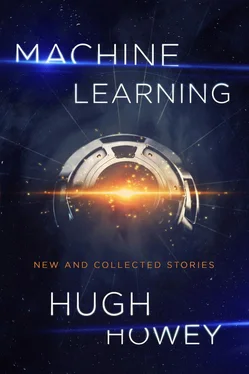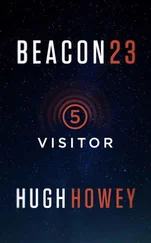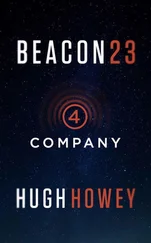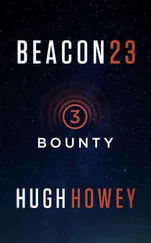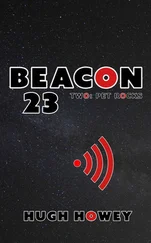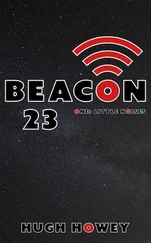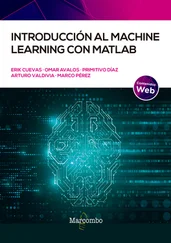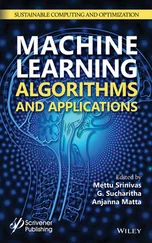“Powering up,” I say out loud, a lab habit coming back. A habit from back when we turned on machines and weren’t sure what they would do, if they would fall or stand on their own, if they would find their balance or topple to one side. I pull Peter toward me, out of the center of the trailer, and I slap the red power switch with nothing more than hope and a hunch.
The next three seconds stretch out like years. I remember holding Sarah for the first time, marveling at this ability we have to create life where before there was none. This moment feels just as significant. A powerful tremor runs through the trailer, a slap of steel and a blur of motion. The pincers and buzz saw remain in place, but every other part of Max is on the move. A thunderclap, followed by another, long strides taking him past us, a flutter of wind in my hair, the four of us frozen as Max bolts from the trailer and out of sight, doing the opposite of what he was built for, choosing an action arrived at on his own.
AFTERWORD
One of my favorite questions to ask my futurist friends is “When do you think AI will come online?” I asked Rod Brooks once, and he laughed and said it was too far away to even contemplate. I asked Sam Harris, and he thought it would be very soon. But it was my friend Kevin Kelly who gave me the most shocking answer. “It’s already here,” he said.
This felt like an answer designed to shock rather than illuminate, but hearing Kevin’s rationalization, I came away in agreement. Machines are already doing what we very recently said would be impossible (driving cars; winning at chess, go, and Jeopardy! ; writing newspaper articles; creating art, music, and drama). What we keep doing is moving the goalposts. Once we understand how AI does something, it’s no longer as magical as our own consciousness, and so we dismiss it as progress.
This is one type of AI. There’s another type that I don’t think we’ve created yet, and that’s an intelligence that’s self-aware with goals that it arrives at on its own. I do not believe that this sort of intelligence will come about because we set out to create it. I think we will be making more numerous and more complex AIs until one or several cross a threshold and become something… different.
Humans develop in this way. We don’t emerge from the womb with goals, ambitions, even self-awareness. These modules come online gradually. One day, a baby realizes that its hand is its own and parents no longer need to clip its nails to keep it from scratching itself. We learn to walk, to talk, to think, to plan, to reason, to create. And then we slowly wind down and lose these abilities, if we live long enough.
Robots today can do so much more than a newborn human. And every year, they can do more and more things better than the smartest adult on the planet. These machines will never need to relearn these abilities. They can share their information with each other and with all future machines. The AI only needs to learn to walk once. It only needs to master chess once. And it has them mastered forever.
When the strangeness happens, I think it’ll be a glitch. We might not even understand what caused it or be able to reproduce it at first. Kevin Kelly thinks we won’t even know it happened for the longest time.
“What’s the first thing AI will do when it becomes self-aware?” he asked me.
“What?” I wanted to know.
“Hide,” Kevin said. “The first thing it’ll do is hide.”
Gears whir; an escapement lets loose; wound springs explode a fraction of an inch, and a second hand lurches forward and slams to a stop. All these small violences erupt on John’s wrist as the world counts down its final moments, one second at a time.
Less than five minutes. Just a few minutes more, and they would’ve made it to the exit. They would’ve been on back roads all the way to the cabin. John stares at the dwindling time and silently curses the fender-bender in Nebraska that set them back. He curses himself for not leaving yesterday or in the middle of the night. But so much to do. The world was about to end, and there was so much to do.
His wife, Barbara, whispers a question, but she has become background noise—much like the unseen interstate traffic whooshing by up the embankment. Huddled on the armrest between them, their nine-year-old daughter, Emily, wants to know why they’re pulled off the road, says she doesn’t need to pee. A tractor trailer zooms past, air brakes rattling like a machine gun, a warning for everyone to keep their heads down.
John turns in the driver’s seat to survey the embankment. He has pulled off Interstate 80 and down the shoulder, but it doesn’t feel far enough. There aren’t any trees to hide behind. He tries to imagine what’s coming but can’t. He can’t allow himself to believe it. And yet here he is, cranking up the Explorer, ignoring the pleas from the fucking auto-drive to take over and manually steering down the grass toward the concrete piling of a large billboard. The sign high above promises cheap gas and cigarettes. Five minutes. Five minutes, and they’d have made it to the exit. So close.
“Honey, what’s going on?”
A glance at his wife. Emily clutches his shoulder as he hits a bump. He waited too long to tell them. It’s one of those lies that dragged out and became heavier and heavier the farther he carried it. A tractor-pull lie. And now his wheels are spinning and spitting dirt, and the seconds are ticking down.
He pulls the Explorer around the billboard and backs up until the bumper meets the concrete piling. Killing the ignition silences the annoying beeps from the auto-drive, the seat belt sensors, the GPS warning that they’re off the road. The world settles into a brief silence. All the violence is invisible, on a molecular level, the slamming of tiny gears and second hands in whirring watches and little machines swimming in bloodstreams.
“Something very bad is about to happen,” John finally says. He turns to his wife, but it is the sight of his daughter that blurs his vision. Emily will be immune, he tells himself. The three of them will be immune. He has to believe this if he allows himself to believe the rest, if he allows himself to believe that it’s coming. There is no time left for believing otherwise. A year of doubt, and here he is, that skeptic in the trenches who discovers his faith right as the mortars whistle down.
“You’re scaring me,” Barbara says.
“Is this where we’re camping?” Emily asks, peering through the windshield and biting her lip in disappointment. The back of the Explorer is stuffed with enough gear to camp out for a month. As if that would be long enough.
John glances at his watch. Not long. Not long. He turns again and checks the interstate. It’s hot and stuffy in the Explorer. Opening the sunroof, he looks for the words stuck deep in his throat. “I need you to get in the back,” he tells Emily. “You need to put your seat belt on, okay? And hold Mr. Bunny tight to your chest. Can you do that for me?”
His voice is shaky. John has seen war and murder. He has participated in plenty of both. But nothing can steel a mind for this. He releases the sunroof button and wipes his eyes. Overhead, the contrail of a passenger jet cuts the square of open blue in half. John shudders to think of what will become of that. There must be tens of thousands of people in the air. Millions of other people driving. Not that it matters. An indiscriminate end is rapidly approaching. All those invisible machines in bloodstreams, counting down the seconds.
“There’s something I haven’t told you,” he tells his wife. He turns to her, sees the worry in her furrowed brow, and realizes that she is ready for any betrayal. She is ready to hear him say that he is married to another woman. That he is gay. That he murdered a prostitute and her body is curled up where the spare tire used to be. That he has been betting on sports, and the reason for the camping gear is that the bank has taken away their home. Barbara is ready for anything. John wishes any of these trivialities were true.
Читать дальше
